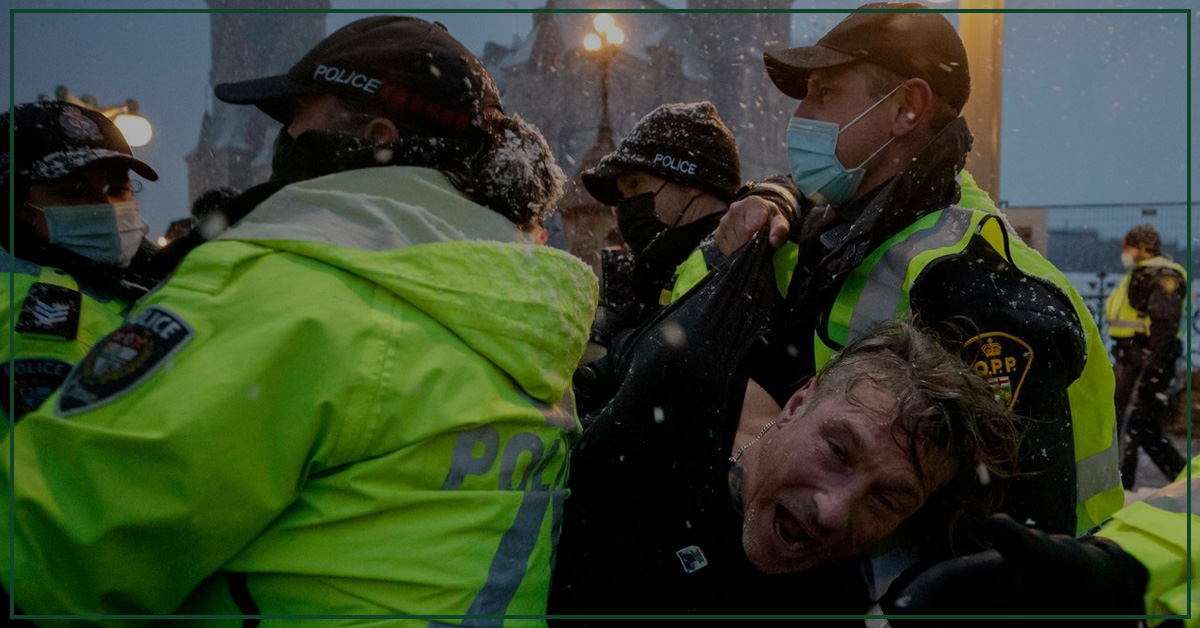Police started arrests of people protesting against Covid-19 mandates on Thursday evening, including two organizers, after promising up and coming acts to eliminate a weeks-long settlement from the streets of Canada’s capital city.
The arrests came after different alerts from police to those involved with the barricade known as the Freedom Convoy and now in its third week-that, they would confront severe penalties on the chance that they didn’t leave the area deliberately. Two of the protest group organizers, Chris Barber and Tamara Lich, were among those arrested on Thursday evening.
The arrests started soon after police plunged into midtown Ottawa’s centre and cordoned off a wide area of the city with almost 100 checkpoints.
“It’s an ideal opportunity to go,” break Police Chief Steve Bell, talking at a news gathering, let the protestors know who have stayed disobedient despite repeated alerts. “Your time in our city has concluded, and you should leave.”
Bell said police were solidifying the perimeter around the city and had assigned an enormous region as a protected zone, where access would be restricted to inhabitants, labourers and cops. Authorities have been quick to stay away from a repeat of earlier ends of the week when the groups expand, particularly because this is a long holiday weekend.
The truck horns and music that have boomed almost unremittingly since late January were discontinuously quiet as officials massed in the cold drizzle on Thursday morning however, the demonstrators who came here to protest Covid pandemic limitations and the public authority of Prime Minister Justin Trudeau kept on processing among the vehicles sticking the roads around Parliament.

For the subsequent day, police distributed fliers cautioning of criminal accusations and the conceivable capture of vehicles. But on Kent Street, amid the rows of murmuring trucks being refuelled by volunteers with jerrycans, there sat a latrine with a sign directing police to put their tickets inside it.
New fencing was raised on the Parliament Hillside of Wellington Street, close to the demonstrators’ settlements. Police from Quebec had shown up to help, Bell said.
Trudeau, this week became the first Canadian pioneer to summon the Emergencies Act. Parliament Hill, the encompassing parliamentary area and a few government structures were declared forbidden for public congregations.
Police kept on arresting people, however, took no action to clear the protest up.
The Emergencies Act enables specialists to control the fights and track their financing. The moves set up for the tougher activity to suppress the deadlock grasping the city. Parliament started a discussion on the action on Thursday.
Trudeau said he didn’t invoke the demonstration to dispatch the military, suspend fundamental rights or limit freedom of expression.
“A few protestors came to Ottawa to communicate their disappointment and weakness with public health measures. That is their right,” the Liberal chief said. “Yet, the illicit barricades and occupations are not. They need to stop.”
The act took effect when Trudeau summoned it on Monday, but it could be denied by a vote of either the House of Commons or the Senate. The opposition Conservatives, whose interim leader at first cheered on the convoy, have said they won’t uphold the movement. They blame Trudeau for overextending.

The New Democratic Party has said that it will uphold the public authority, guaranteeing it has an adequate number of votes in the House of Commons.
The Canadian Civil Liberties Association said Thursday that it was prosecuting the public authority. The group says it had not met the legal limit to conjure the demonstration.
Banks have begun to freeze accounts connected to protesters after the Royal Canadian Mounted Police gave them a rundown of names. Chrystia Freeland, Canada’s finance minister, said Thursday that “action is being taken” and accounts had been frozen, however, declined to give specific numbers.
The Canadian Bankers Association said, “all financial service organizations, including banks, covered by the federal Emergencies Act should tirelessly carry out the necessary measures, as specified by the public authority.” It said the moves “are not relied upon to affect by far most of the clients.”
Tow truck administrators have been stressed over the dangers to their safety and future business on the off chance that the public authority requests that they eliminate the enormous apparatuses sticking midtown Ottawa, an industry chief told Canada’s public radio broadcaster Wednesday.
The country’s public safety minister cautioned of protesters links to far-right groups. Police captured 11 individuals and held onto weapons and ammo Monday at a border blockade in Coutts, Alberta. Four individuals were charged with conspiracy to commit murder. A few protesters passed on that site after the captures to avoid violence.
Police in Windsor, Ontario, said Wednesday that they had captured a convoy that was trying to bar the Ambassador Bridge once more. The range between Windsor and Detroit is the most active intersection on the U.S.- Canada border. Specialists cleared a barricade there on Sunday.





